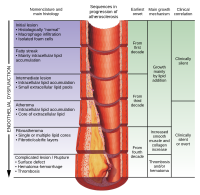
Photo from wikipedia
The vascular endothelium is not only the semipermeable membrane that separates tissue from blood but also an organ that regulates inflammation, vascular tone, blood clotting, angiogenesis and synthesis of connective… Click to show full abstract
The vascular endothelium is not only the semipermeable membrane that separates tissue from blood but also an organ that regulates inflammation, vascular tone, blood clotting, angiogenesis and synthesis of connective tissue proteins. It is susceptible to the direct cytotoxic action of numerous xenobiotics and to the acute hypoxia that accompanies acute poisoning. This damage is superimposed on the preformed state of the vascular endothelium, which, in turn, depends on many humoral factors. The probability that an exogenous toxicant will cause life‐threatening dysfunction of the vascular endothelium, thereby complicating the course of acute poisoning, increases with an increase in the content of endogenous substances in the blood that disrupt endothelial function. These include ammonia, bacterial endotoxin, indoxyl sulfate, para‐cresyl sulfate, trimethylamine N‐oxide, asymmetric dimethylarginine, glucose, homocysteine, low‐density and very‐low‐density lipoproteins, free fatty acids and products of intravascular haemolysis. Some other endogenous substances (albumin, haptoglobin, haemopexin, biliverdin, bilirubin, tetrahydrobiopterin) or food‐derived compounds (ascorbic acid, rutin, omega‐3 polyunsaturated fatty acids, etc.) reduce the risk of lethal vascular endothelial dysfunction. The individual variability of the content of these substances in the blood contributes to the stochasticity of the complications of acute poisoning and is a promising target for the risk reduction measures. Another feasible option may be the repositioning of drugs that affect the function of the vascular endothelium while being currently used for other indications.
Journal Title: Journal of Applied Toxicology
Year Published: 2022
Link to full text (if available)
Share on Social Media: Sign Up to like & get
recommendations!